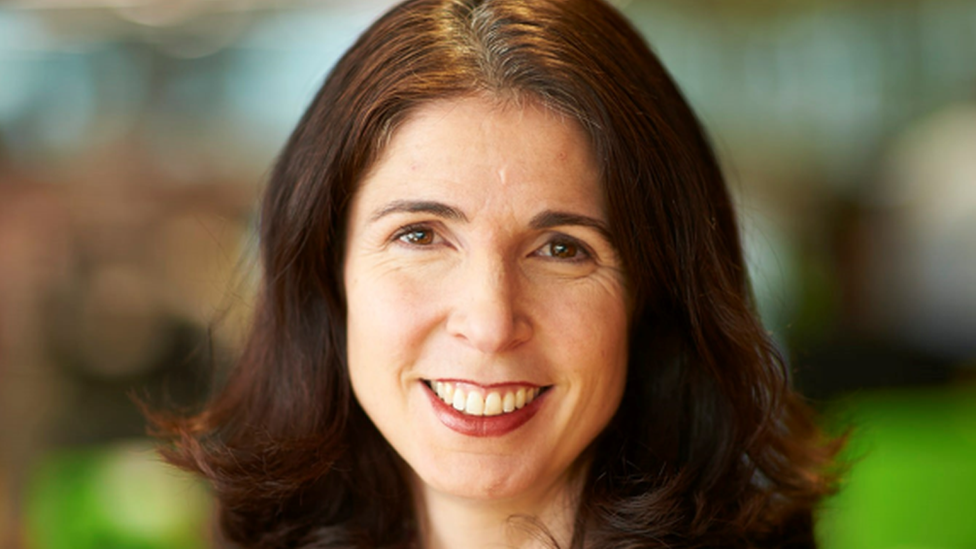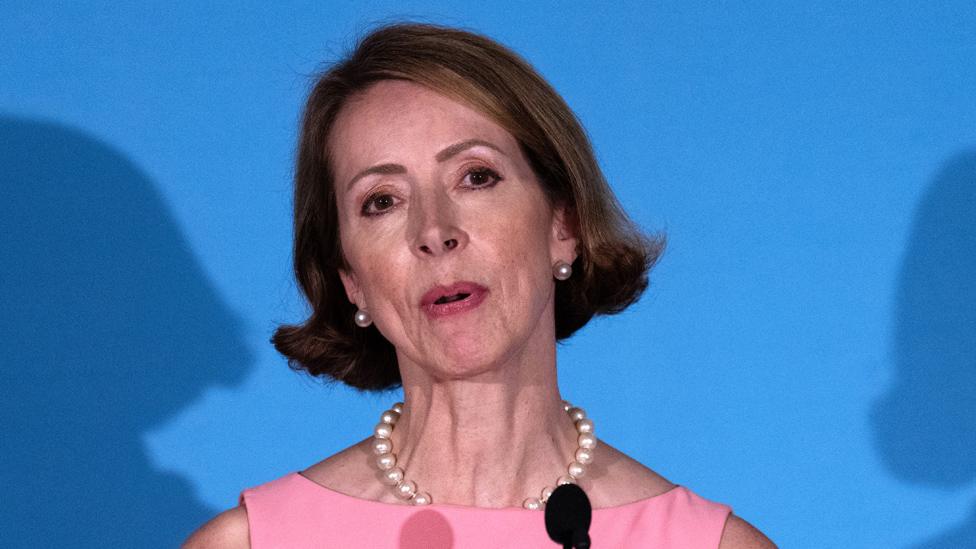CBI: New business group boss says sorry for failing victims
- Published

CBI director general Rain Newton-Smith
The new boss of the CBI has said she is "profoundly sorry" for how victims of sexual misconduct were let down by the business group.
Rain Newton-Smith takes up the top job as the group fights for its survival.
In a series of tweets,, external she said she wanted to "recognise the courage of the women who came forward" and said she would "rebuild and reimagine" the CBI.
The lobby group has admitted it failed to sack staff who sexually harassed female workers.
Ms Newton-Smith started her new role on Wednesday, in a return to the CBI where she was previously chief economist.
She tweeted that the organisation knew there was "so much to do to win back the trust of our members, our colleagues and wider society".
"But I believe in the work of the CBI and our people, and I am determined to rebuild and reimagine our organisation to regain that trust," she added.
She said she hoped to reward the "bravery" of women who spoke out about misconduct "by finding a better path forward".
The CBI has been facing a crisis since the Guardian newspaper published claims, external of workplace misconduct, harassment and sexual assault including two allegations of rape.
CBI president Brian McBride has pledged to implement recommendations following an investigation by law firm Fox Williams.
But some have questioned whether Ms Newton-Smith, a former employee and executive committee member, is the right person to lead the organisation through the scandal.
She worked at the CBI for nearly nine years before briefly leaving in March to work at Barclays.
Commenting on Ms Newton-Smith, Baroness Morrissey, a City fund manager who currently chairs investment firm AJ Bell, told the BBC: "I'm sure she is wonderful in lots of respects but it doesn't quite cut the mustard if you're trying to show that you're embracing a new approach to all of this."
Since more allegations have emerged about the CBI, dozens of firms have either ended their membership or suspended any activity with the organisation.
Companies who have suspended their membership include John Lewis, BMW, Virgin Media O2, insurers Aviva, Zurich and Phoenix Group, banking firm Natwest, credit card company Mastercard; B&Q owner Kingfisher, media firm ITV, accountancy giant Deloitte and FTSE 100 software group Sage.
The City of London Corporation has also announced that it had suspended its membership of the CBI.
Ann Francke, chief executive of the Chartered Management Institute, said: "If you look at these kinds of reputation implosions, which are very tragic for everybody and weigh heavily on everybody... the usual approach is to get an external perspective to address the very deep-seated issues that need changing."
The CBI, claims to represent 190,000 companies, which it said employ around seven million people.
One of its key roles is to lobby the government on behalf of its members.
But earlier this month the government said it had suspended activity with the CBI and this week Chancellor Jeremy Hunt said: "There's no point engaging with the CBI when their own members have deserted them in droves."

What is the CBI?
The CBI - the Confederation of British Industry - is one of the UK's most prominent lobby groups and, according to its former president Paul Drechsler, was instrumental in protecting millions of jobs during the Covid pandemic by helping the rapid roll-out of the furlough scheme.
The CBI campaigned against Brexit. Once the UK voted to leave the European Union, it lobbied the government to secure a trade and co-operation agreement.
Another function of the CBI is to promote and share best practice among its members.
Founded in 1965, today it employs around 300 people. Its director generals have been predominately male with the exception of Dame Carolyn Fairbairn, who led the group between 2015 and 2020 and now Ms Newton-Smith.

Wayne Wright, managing partner of business advisory group Wsq Solutions, said the new CBI leader had "four weeks" to "at least put a marker down" on how the organisation would not only go about changing but also implementing and measuring the measure.
He said embedding a new culture at a business typically takes a couple of years, but added the CBI "has not got that luxury".
Ms Newton-Smith agreed to return to the CBI after her predecessor, Tony Danker, was fired following separate complaints of workplace misconduct.
David Samuels, an employment partner at law firm Lewis Silkin, said: "She has a big task on her hands because the CBI clearly has a lot of cultural change to be put in place and they need to regain the confidence of the public and their members."
He added: "She's someone who worked there previously and of course that could be used against her, but at the same time she will understand the organisation and perhaps, therefore, she'll be able to get to grips with the changes and implement those changes more swiftly."
Mr McBride said Ms Newton-Smith "has shown great courage in accepting this position at a very difficult time".
He said: "We asked Rain to return to the CBI, not only because of her very considerable economic and policy expertise, but because the employees of the CBI deeply trust and respect her."
Following the allegations, the CBI has suspended all its policy and membership activities until June. It will then hold an extraordinary general meeting where it will put forward proposals to its members "for them to decide on the future role and purpose of the organisation".
Additional reporting by Oliver Smith
Related topics
- Published25 April 2023

- Published24 April 2023
